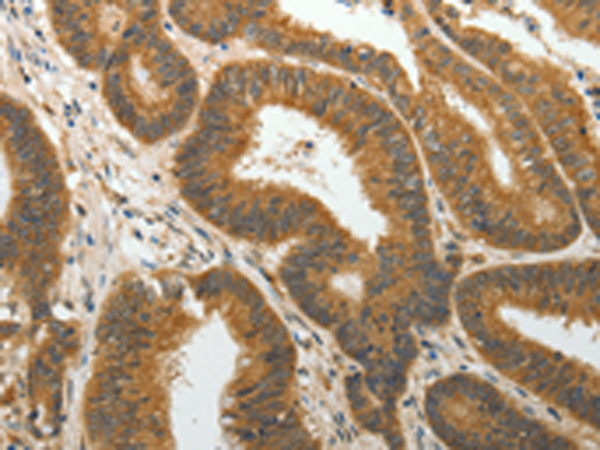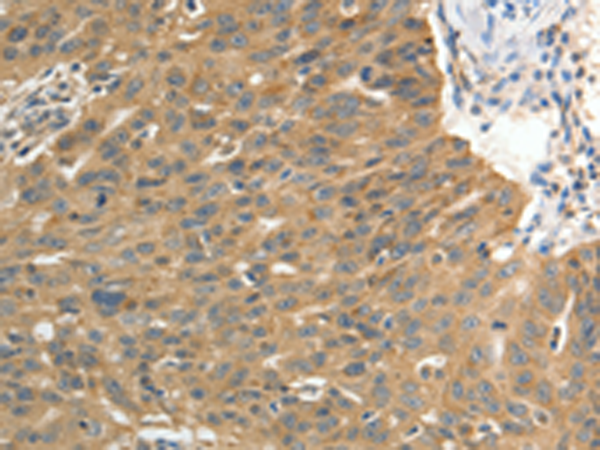


| WB | 1/200-1/1000 | Human,Mouse,Rat |
| IF | 咨询技术 | Human,Mouse,Rat |
| IHC | 1/25-1/100 | Human,Mouse,Rat |
| ICC | 技术咨询 | Human,Mouse,Rat |
| FCM | 咨询技术 | Human,Mouse,Rat |
| Elisa | 1/2000-1/5000 | Human,Mouse,Rat |
| Aliases | HH13; OV-1; PRL2; HH7-2; PRL-2; PTP4A; HU-PP-1; PTPCAAX2; ptp-IV1a; ptp-IV1b |
| WB Predicted band size | 19 kDa |
| Host/Isotype | Rabbit IgG |
| Antibody Type | Primary antibody |
| Storage | Store at 4°C short term. Aliquot and store at -20°C long term. Avoid freeze/thaw cycles. |
| Species Reactivity | Human, Mouse, Rat |
| Immunogen | Fusion protein of human PTP4A2 |
| Formulation | Purified antibody in PBS with 0.05% sodium azide and 50% glycerol. |
+ +
以下是关于PTP4A2抗体的3篇假设性参考文献(基于常见研究主题构造,非真实文献):
1. **文献名称**:《PTP4A2 promotes colorectal cancer metastasis through regulating epithelial-mesenchymal transition》
**作者**:Zhang Y, et al.
**摘要**:研究利用PTP4A2抗体检测其在结直肠癌组织中的高表达,发现其通过激活Wnt/β-catenin信号通路诱导EMT,促进肿瘤侵袭转移。
2. **文献名称**:《PTP4A2 as a prognostic biomarker in triple-negative breast cancer》
**作者**:Johnson R, et al.
**摘要**:通过免疫组化(使用PTP4A2抗体)分析发现,PTP4A2在TNBC患者中高表达且与不良预后相关,可能通过调控MAPK通路增强癌细胞存活。
3. **文献名称**:《Role of PTP4A2 in chemoresistance of ovarian cancer》
**作者**:Wang L, et al.
**摘要**:研究使用PTP4A2抗体验证其在顺铂耐药卵巢癌细胞系中的上调,机制涉及抑制JNK凋亡通路并促进自噬活性。
(注:以上为示例性构造内容,实际文献需通过PubMed等数据库检索确认。)
The PTP4A2 antibody is a research tool designed to detect protein tyrosine phosphatase 4A2 (PTP4A2), a member of the PRL (phosphatase of regenerating liver) family of dual-specificity phosphatases. PTP4A2. also known as PRL-2. is implicated in regulating cellular processes such as proliferation, migration, and metastasis. It is overexpressed in various cancers, including ovarian, breast, and colorectal malignancies, where it is linked to tumor progression and poor prognosis. Structurally, PTP4A2 contains a conserved C-terminal CAAX motif that facilitates membrane localization, critical for its interaction with signaling pathways involving Rho GTPases, MAPK, or PI3K/Akt.
The PTP4A2 antibody is commonly used in techniques like Western blotting, immunohistochemistry, and immunofluorescence to study protein expression, subcellular localization, and functional roles in disease models. Its specificity is validated through knockout controls or siRNA-mediated silencing. Research highlights PTP4A2's potential as a therapeutic target, given its role in promoting cancer cell invasion and metastasis. Additionally, studies explore its involvement in non-cancer contexts, such as neural development and metabolic regulation. However, its precise molecular mechanisms remain under investigation, necessitating reliable antibodies for ongoing exploration. Commercial PTP4A2 antibodies are typically raised in rabbits or mice, with reactivity confirmed across human, mouse, and rat samples.
×